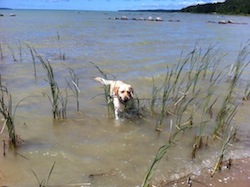Sometimes, the most important question is the one you don’t ask.
Last winter, my veterinarian called to say that my dog had an elevated liver enzyme. He recommended an expensive and invasive round of tests to confirm his suspicion: a potentially fatal condition that is treatable by a change in diet.
I’d never doubted a physician in my life, but something didn’t feel right.
We agreed that I would do some research on my own. I consulted several out-of-town vets. After hearing their opinions (all different), my vet suggested I take Scout to a local vet internist.
The first thing the internist said: “Before I look at her chart, just talk. Tell me about your dog.”
Then he told me that I’d given him the critical clue, information he’d never get if he started with a list of questions.
A few non-invasive and inexpensive tests later, he offered a different diagnosis – one with an excellent prognosis. Scout is now on a vegetarian diet that includes prescription dog food and ordinary people food. Enzyme counts are, so far, normal. She is a happy dog.
My odyssey into dog healthcare was a window into my work. I also ask people to “just talk.” And I never use a list of questions.
Like the vet said, “A list presupposes an answer, or at least a direction you think leads to an answer. You can miss the clues.”
I try to talk with people who will be the audience before I write a single word. I do this to understand the context in which the message will land. By learning what’s going on in their work lives, I find out what other issues are competing for their attention. I can figure out what parts of the message will most impact their world. Most important, I hear about the elephants in the room – issues the message must address or the listeners won’t hear anything my client has to say.
The parallels only go so far, but the vet and I both let people “just talk” to get clues that help us diagnose and treat for the best results.
My clients appreciate my approach, but some ask to see my list of questions.
Next time this happens, I’m going to tell them about Scout.
Want to know the clue to Scout’s treatment? shelley@shelleycowan.com
